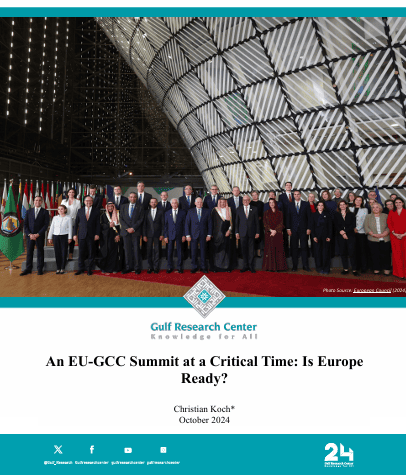
On October 16, 2024, the European Union (EU) and the Gulf Cooperation Council (GCC) will hold their first ever summit meeting at the heads of state level. It comes at a critical time given the situation in the Middle East and the imminent danger in which the attacks between Israel and Iran are beginning to engulf the entire region.
For the EU, the strategic relevance of the GCC states has become clearer in recent years. Efforts to increase the cooperation with these countries have culminated in a new policy approach in June 2022 followed by the appointment of an EU Special Representative for the Gulf region, as well as increasingly closer institutional ties at the political, security, and economic level. The effort is earnest, and the process is beginning to bear some fruit.
The EU and the GCC share common interests when it comes to the Middle East. This includes a just resolution to the Palestinian issue, the avoidance of a wider war involving Israel and Iran, and concerted efforts to contain Houthi attacks against international shipping in the Red Sea. The GCC states require stability in their neighborhood to implement their far-reaching economic modernization and diversification programs. The EU needs the same stability to allow economic development and reform to take place in its southern neighborhood and ease migration flows.
Yet, on the ground, the policy approaches do not match. The GCC states are doing their part. They have resolved the rift with Qatar from within the GCC, pushed for a political solution to the conflict in Yemen, and opened communication channels to Iran enabling them to convey messages to the Iranian leadership about the negative implications of further escalation. On the situation in Palestine, they have taken the lead and put together a coalition of moderate Arab and Islamic states to push for the two-state solution based on the Arab Peace Initiative.
What is missing now is a similar European effort and contribution. Europe’s failure to equally condemn the atrocious attacks by Hamas on October 7 and Israel’s unjustified carnage against Palestinian civilians, has decimated European credibility in the entire Middle East. Europe is not only seen as divided but European voices on human rights, humanitarian law, and justice are viewed as hypocritical and as a result are falling on deaf ears. With the GCC urging Iran not to escalate, the least the EU can do is the same with Israel.
Europe’s reputation is failing in other domains as well. In maritime security, its half-hearted attempt in the Red Sea in the form of Operation Aspides is exposing Europe’s unreadiness and/or unwillingness to play an adequate security role despite the fact that disrupted supply chains and interruptions to the freedom of navigation have a direct impact on European economic well-being.
On the situation in North Africa and the Levant, the EU’s increased securitized approach to migration is strengthening authoritarian governments instead of tackling the underlying social tensions that threaten state stability and are the cause for migration in the first place. In addition to the failed state scenarios being witnessed in Yemen, Libya, Syria and Lebanon, other countries such as Jordan, Egypt, and Tunisia are finding themselves in increasingly precarious positions. This instability serves neither the EU nor the GCC. It should be clear that Europe’s policies in the Middle East simply do not work. Instead of sticking to the same ineffective pronouncements, Europe should honestly ask itself what changes to its approach are urgently needed. Given their similar interests, greater convergence between the EU and the GCC states on joint policies would be one way forward.
The EU-GCC agenda also extends beyond the immediate urgent regional security issues. With all six GCC states pursuing wide-ranging economic diversification efforts, trade ties to Europe and access to European technology play important roles. The Gulf is a highly relevant market for European companies with lucrative opportunities in the many mega-projects being pursued and implemented there. The GCC construction market alone is projected to have a value of more than 200 billion Euros over the next years.
On the energy side, European cooperation in terms of technology transfer is critical with the GCC determined to make their industry more climate neutral. The GCC states understand that the energy transition, including renewable energy deployment, is creating wide-spread opportunities for climate change mitigation and adaptation as well as economic diversification. The GCC states are already making massive investments in the development of blue and green hydrogen. Together with the growing climate vulnerability of the Gulf, the timing is right to join the EU’s Green Deal with projects such as the Saudi and Middle East Green Initiative.
What Europe must understand is that the GCC states will not wait until they meet all the requirements put forward by European partners to see economic and energy ties flourish. If Europe is not ready, Asian countries in particular stand ready to take advantage of the numerous opportunities available. Already, Asia has replaced the EU as the GCC’s first trade partner.
Finally, emphasis must be placed on extending people-to-people networks. All EU countries enjoy almost complete visa free access to the GCC states. In Saudi Arabia, visas are issued online within hours. The same privilege does not exist for GCC citizens in Europe. This has implications for educational, cultural, and overall social ties. Capacity building remains essential to promoting long-term engagement, and addressing these dynamics is crucial to establishing trust and ensuring that EU-GCC cooperation can thrive. The first ever EU-GCC Summit comes at a truly critical point in time. The GCC states are ready to throw their full weight behind the effort to make EU-GCC relations truly strategic. The question now is whether the EU and its member states are ready to do the same.
*Christian Koch is Director of Research at the Gulf Research Center and manages the Gulf Research Center Foundation office in Brussels.
